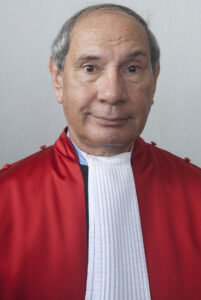President

Justice Richard Brunt Lussick is the President of the Residual Special Court for Sierra Leone (RSCSL). He was appointed on the 29th February 2024, for a period of two years. He was appointed to the RSCL by the United Nations in 2013.
Justice Lussick was a former trial judge of the Special Court for Sierra Leone from 2004 to 2012. He was presiding judge in the trial of Charles Taylor in 2012 when Mr Taylor was convicted and sentenced to 50 years imprisonment.
Justice Lussick was the 6th President of the United Nations Appeals Tribunal. He served in that tribunal from 2012 to 2019. From 1995 to 2000, he served as Chief Justice of the Republic of Kiribati. He was appointed to the Bench in Samoa in 1987 and held appointments to the District Court, Supreme Court, Court of Appeal, Land and Titles Court and as Acting Chief Justice. He also served as the Chairman of the Public Service Board of Appeal from 1987 to 1995. He was Vice President of the Commonwealth Magistrates and Judges Association (Pacific Region) from 1997 to 2000. He had practised as a Barrister-at-law in Sydney, Australia, from 1973 to 1986, when he was appointed Parliamentary Counsel to Samoa.
Prosecutor

James C. “Jim” Johnson initially joined the Office of the Prosecutor at the SCSL in 2003 as a Senior Trial Attorney, and was named Chief of Prosecutions in January 2006.
After he left the SCSL in 2012 he served for three years as President and CEO of the Robert H. Jackson Center in Jamestown, New York.
Since 2013 he has been an Adjunct Professor of Law and Director of the Henry T. King War Crimes Research Office, Case Western Reserve University School of Law in Cleveland, Ohio. He is also Director of the International Humanitarian Law Roundtable and President of the Global Accountability Network.
Prior to joining the SCSL, he served for twenty years as a Judge Advocate in the United States Army. He was named Prosecutor of the RSCSL in September 2019.
Registrar

Binta Mansaray was appointed Registrar of the Residual Special Court for Sierra Leone by the Secretary-General of the United Nations in September 2014. She had served as Acting Registrar of the Residual Special Court since its inception in January 2014. She previously served as Registrar of the Special Court for Sierra Leone, a post she held from February 2010 to December 2013, when the Special Court closed upon the successful completion of its mandate. From July 2007 to February 2010, she was Deputy Registrar, and while continuing to hold that post, she was appointed Acting Registrar in June 2009.
Ms. Mansaray first joined the Special Court in 2003 as Outreach Coordinator, during which time she designed the Court’s widely-acclaimed Grassroots Programme to keep the people of Sierra Leone, and later Liberia, informed about the Court and its trials. Prior to joining the Court, Ms. Mansaray was a human rights advocate for victims and women and adolescent ex-combatants of the Sierra Leone armed conflict, working with a number of organizations: She held the post of Protection Partner/Country Representative for the Women’s Commission for Refugee Women and Children in Sierra Leone; she worked with the Campaign for Good Governance, several civil society organizations, and she served as a consultant with the United Nations Mission in Sierra Leone (UNAMSIL).
As Registrar of the Residual Special Court, she initiated and oversaw the refurbishment, development and expansion of the Sierra Leone Peace Museum, which seeks to educate visitors, through artifacts and records, about Sierra Leone’s civil war and its aftermath, and about transitional justice. The Museum houses the public records of the Special Court for the benefit of Sierra Leoneans, visiting researchers and future generations. The Museum also has a Memorial Garden designed to promote contemplation of the tragedy of the country’s armed conflict, and in remembrance of those who lost their lives.
Ms. Mansaray is a graduate of the University of Sierra Leone. She received a Master’s degree in French from Fordham University in New York and a Master’s degree in Public Administration and Policy from American University in Washington, DC., and she obtained a certificate after successfully completing a one-year training on Women and Armed Conflict which was organized by ISIS-WICCE in Kampala in 1999 – 2000.
In April 2018, Ms. Mansaray was inducted by the American University into Pi Alpha Alpha, a Global Honour Society which recognizes outstanding scholarship in public administration and public affairs. The awards and recognition she has received include the following: In July 2022, Ms. Mansaray was the recipient of the first National Reconciliation Award for her dedicated contribution to transitional justice and human rights in Sierra Leone for over a decade. In 2014, she was made Commander of the Order of the Rokel by then-President Ernest Bai Koroma for her work at the Special Court.
The Order of the Rokel is Sierra Leone’s highest civilian award. In 2006, she was named Princess Kavura by the then Paramount Chief of Moyamba District in Sierra Leone for outstanding work as Outreach Coordinator in the district. In December 2005, she was an honoree of Global Rights in Washington, DC, in recognition of her remarkable role in promoting the rights of women during the war in Sierra Leone.
Principal Defender

Ibrahim Yillah is a graduate of Fourah Bay College, University of Sierra Leone. He obtained his LLB (Hons) in 1996 in Freetown, and later graduated with LLM at the University of Pretoria in Human Right Law.
He was appointed Principal Defender in 2014. Fourah Bay College University of Sierra Leone. He previously served as Counsel in the Defence Office at the Special Court for Sierra Leone, and also as Trial Attorney in the Office of the Prosecutor at the International Criminal Court in The Hague, the Netherlands.
He has considerable experience in Criminal Litigation, and he is also currently working as a Consultant in Environmental Law in Sierra Leone.
